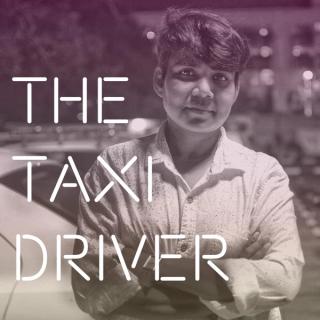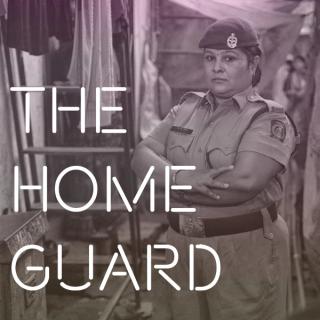
Episode 1: The Taxi Driver
Nisha is a taxi driver who isn’t afraid to defend her turf.

For women, leaving home after dusk implies an automatic invitation to danger and societal censure. Some people have even justified sexual assault and rape on the premise that women out late at night should expect aggression.
Amidst this, four women — a cab driver, a bouncer at a popular club, a bar dancer, and a home guard constable guarding the women’s compartment in the local trains — have been defying societal constraints and patriarchal mindsets each night when they go to work. These four Mumbai women work through the night, breaking boundaries that society has traditionally set on women’s mobility, morality, and sexuality.
Here are their stories.
This episode follows Nisha, a cab driver who gives as good as she gets from the male drivers who outnumber her.
NISHA, THE TAXI DRIVER
Voice Over
Audio Montage 1
English News Anchor speaks
Male politician: I believe that if my sister or daughter goes out in the night on New
Year’s Eve with men other than her father or husband, then I can’t expect her to be
treated with respect by people.
Male politician: Every one has a ‘Lakshman Rekha’ drawn around them. If anyone
crosses that Rekha, then they are bound to land in danger.
Voice Over
Nisha: You know people have that fear sometimes. Hence, they keep saying that I
should not drive in the night. But, the problem is, I love driving in the night! It is a
breeze to drive in the night, no cops to worry about, no traffic lights; you can zip
across the city.
Voice Over
Nisha: I used to work in a security firm earlier. Once, I met a lady cab driver who was
dropping a passenger off at my workplace. Till that day, I had no idea that there
were women cab drivers. I always felt driving was not for women. I took down the
details about the cab agency and went to my supervisor and convinced him to give
me only night shifts for two months because I wanted to learn something new. He
agreed so I started learning how to drive, without even mentioning this to my
mother.
Voice Over
Nisha: When I finally got my license, I told my mother. But she would not agree to
let me drive. She would just not budge. I even got a few lady drivers and friends to
come and convince her. We had to work really hard at convincing her. Finally she
agreed and allowed me to take up the driver’s job.
But then, my mother’s brother started creating problems. He would incessantly
criticise my mother for allowing me to drive. He said our family does not allow
women to drive. My mother tried reasoning with him, but I felt like I had to step in. I
told him that this is my life, this is my problem. I told him I won’t do anything to give
my mother a bad name. So there will be no problem.
Kunal: But was that just this uncle or did other members of your family oppose your
decision as well?
Nisha: All the male members of the family. (Laughs) Because I was the only woman
in the family to drive. Their daughters and sisters were all wearing the veil, so they
wanted me to do the same.
Voice Over
Nisha: My father used to be driver. He died in a car accident, while driving. From
that day, my mother has been so scared of vehicles that she still does not allow my
brother to buy a bike.
Kunal: So your mother’s objection stemmed from this fear, primarily?
Nisha: It was this fear, yes. But now she is not scared. In fact, she rides in my car
with me a lot. She has conquered her fear. But she still worries about the night, so
she keeps telling me to not drive in the night. But I love driving in the night!
Voice Over
Ambient conversation with Nisha and her colleagues.
Voice Over
Nisha and her colleagues: At the counter for prepaid taxis, they ask passengers if
they are okay with a woman driver. This has to stop. This must end. They should not
be asking such questions. Do they ask people if they are okay with a male driver?
Because of such questions when customers come to us, especially men, they look at
us in a cheap way and ask what are the extra ‘facilities’ we are giving them?
Some passengers also come and question us about why the people at the counter
ask such questions. They say, “Are you any different from male drivers?” In fact,
many of them even say that world over, things are changing for women, but is India
still so regressive that it thinks women can’t drive? They ask us this. Mostly, visitors
from other countries ask such questions. In fact, they are shocked at this
discrimination.
When a solo male passenger is given this choice, he starts having bad thoughts
about us.
Voice Over
Nisha: You know how people would earlier say that women can’t drive and only
men can be good drivers? Even now, 99 per cent of the customers feel this way.
They get scared, especially the women passengers. When they see that we are
going to drive them, they refuse. Just because they can’t drive, they think other
women also can’t drive well.
Voice Over
Kunal: So, you are always waiting in this food court?
Nisha: Yes, till we get a fare.
Kunal: But isn’t there a waiting room or a designated place for drivers to rest and
wait or use restrooms?
Nisha: Leave alone a waiting room, we would be thankful even if we just get some
respect around here. (Her friend laughs)
Look, these tables belong to the food court. If they have customers, they evict us.
Then, we sit there (points in one direction), but if we chat or laugh there, the airport
officials come and tell us to leave. Then, there (points in another direction), where
the security stands, if we sit there then the Taj Hotel’s security comes to evict us.
Kunal: So, where are you supposed to sit?
Nisha: We are not supposed to sit. They say, you stand and wait if you want or
leave. Or occupy a quiet corner somewhere. If you don’t, they call the cops to throw
us out.
Voice Over
Background conversation plays out between a passenger, a male cabbie and Nisha
and her friend.
Nisha: When we get a big ride, let us say worth Rs 500 or more, from the airport
counter, even before the passengers can come to our cabs, the male drivers
intercept them mid-way. Then, they try and convince passengers that women
drivers are neither safe nor reliable. They say we are not ‘good’ women. It happens
right here, in front of us.
Once they plant the seed of doubt in the minds of passengers, the passengers feel
like it is a risk to sit in our cars. This is all because the male drivers feel so jealous
that us, women, are getting such big-ticket rides and they aren’t. That’s why they try
so hard to mislead the passengers that the passengers go back to the airport and
cancel their rides with us.
If you want, you can try this yourself and you’ll see that you will want to cancel our
cab too.
Kunal: Do people actually cancel your cabs?
Nisha: Lots of them do!
Nisha’s friend: Then our supervisor often pleads with them and tells them that we
are safe and very reliable drivers. But, once there is doubt in their minds, it is very
difficult for us to change their mindset. Even if you ferry them for free, they won’t
come.
Voice Over
Nisha’s friend: Yes. We even tried offering free rides to passengers! (Laughs). We
agreed to pay them if they didn’t like our driving.
Voice Over
Nisha: Much before Ola and Uber entered the market, there used to be Meru and
Tab Cabs and the like. They used to compete with us fiercely.
Kunal: But, amidst the competition, did they ever behave badly with you?
Nisha: Yes, plenty of times. Whenever they saw one of our cars going, they would
deliberately overtake our cars and cut through very rashly. Then, they would often
abuse us while we would be driving past. They wouldn’t even care that one
shouldn’t abuse a woman.
But, that’s where we drew the line. Whenever they would abuse, we would lose it.
Why should we listen to their abuses? We are here, trying to earn a living by driving
a car. We aren’t committing a crime that we must bear their abuses. We can’t bear a
man abusing us. So, if a male driver abuses us, we stop his car in the middle of the
road and thrash them. We make it a point that we thrash him in a way that he
remembers it for life. That is the one rule we follow — we will not bear someone
abusing us.
Kunal: So, how does this work? If a lady driver has such an altercation, what happens
next?
Nisha: The issue is resolved right there and then. If she has the confidence, she will
thrash the driver herself. If she doesn’t, she will call us and then we all gather there
to teach him a lesson.
What do we do? If we must survive in their field, we must become like them. They
won’t let us survive if they think we are docile and delicate. That’s the problem.
Kunal: Do you feel like you have to project a sense of, what is conventionally
considered, masculine traits to them?
Nisha: Absolutely. We are not scared anymore. In fact, even the cops say that we
are fearless, and we don’t fear anyone anymore. (laughs)
Voice Over
Nisha: This guy, he would always travel in our cabs. This one time, he came out of
the airport and he was drunk. As soon as he sat in the cab, he started asking me
about my family. Generally, when passengers ask us such details, we are happy to
tell them. While we were talking, he asked me something very inappropriate. He
said, I’ll do this and that. I told him one thing straight: I have a very big weapon with
me at this point, one that you can’t imagine. I have the steering wheel with me. I
don’t care, I’ll crash into a wall or something and I will surely die but I will ensure
you die, too. I am not scared of dying.
It’s only then that he backed off and apologised. He’s never taken lady-driven cabs
after that.
Kunal: Do you think being in this profession has changed you?
Nisha: Immensely. Earlier, I was not allowed to step out without a burkha. But, now,
I am so carefree. The other thing is, I did not know what it was to abuse. But, now,
abuses, rough talking, I can do it all so easily. That’s why I say, this profession is
good but also bad. It can transform people but it can also ruin them in some ways.
Earlier, I used to be so shy that I would never talk to anyone apart from my close
ones. But now, I can talk to anyone who comes my way. Now, I can’t stop talking!
Sometimes, I still can’t wrap my head around just how much I have changed in these
last few years!
Voice Over
Nisha: Look, earlier, I used to have really long hair and now, I have a boy cut. I faced
a lot of flak from the male members of the family for this. They blamed my mother
for my transformation and criticised her a lot. But my mother told them that this is
her life and she gets to decide what she wants to do. My mother doesn’t tell us how
we must live or who we must pay heed to. She tells my brother and me to live our
lives the way we want to, but just ensure that the family’s reputation is never
tarnished. If my mother backs me, I don’t care about anyone else in the world.
Voice Over
Nisha: I told my maternal uncle that if you truly care for us, then you should have
supported us when we really needed it.
When I wanted to get married, none of these uncles supported us. I didn’t have a
father so we needed their support. But, they didn’t support my mother. So, I
couldn’t get married. That’s when I decided that I will never marry.
When we really needed it, they didn’t help us. They didn’t support my mother.
Now, when I am living on my own terms, we don’t need their backing. They lost the
right to interfere in my life when they decided to not back me when I needed them
to. That’s why, I don’t care about them anymore. My mother doesn’t have a
problem with the way I am living my life.
Voice Over
Nisha: Yes, this profession has created these problems for me. Before I came into
this, I used to only wear long-sleeved dresses with my head covered at all times. I
led a very different life then.
Kunal: And you once mentioned what your name meant.
Nisha: Yes, my name is Hayatunnisha. Hayaat is Life and Nisha means in the Night.
(Laughs)
This transcript has been lightly edited for clarity.
Keep listening
Browse Series

Episode 3: The Bouncer
